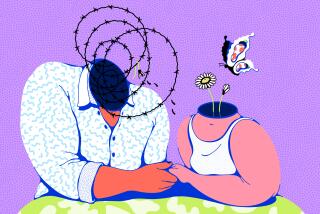As biological clocks go, his is more like a travel alarm
- Share via
Recently I came across the literary equivalent of male Kryptonite -- and it wasn’t chick lit or the latest Danielle Steel romance. It’s called “The Male Biological Clock: The Startling News About Aging, Sexuality, and Fertility in Men.” New books about the female biological clock become instant bestsellers, but not once had this come up in conversation. I had to wonder, don’t men care?
Then I remembered my ex-boyfriend. A few years ago, we were in Whole Foods Market when we ran into a woman he knew. Lena was attractive, funny, had an interesting job. After she left, my boyfriend explained that she’d recently broken up with his friend Paul.
“I feel so bad for her,” my boyfriend said. I asked why -- she seemed happy and besides, she’d been the one to dump Paul.
“It’s not that,” he said, oozing sympathy. “It’s that now she’ll probably never have kids.”
Lena was 38. My boyfriend was 38.
Botox has finally become unisex, but why hasn’t the biological clock? It’s not that men don’t have a biological clock. It’s that they press the snooze bar and place a pillow over their heads when scientific studies come out reporting that the chances of a man having healthy children dip past his 35th birthday, or that damage to the genetic material containing sperm cells greatly increases with age.
Dr. Harry Fisch, who wrote “The Male Biological Clock” and runs the Male Reproductive Center at Columbia University, spells it out: Past age 35, men have increased rates of infertility, are more likely to father a child with Down’s syndrome, and can raise the likelihood of miscarriage. No wonder men want to place their hands over their ears and sing La la la ... I can’t hear you!
But there’s more. In 40% of infertile couples, the problem lies with the man. La la la ... Oh, and men older than 35 have half the chance of fathering a child than men under 30 have. La la la ...
I guess it makes sense that men won’t take a good hard look at their own biological limits (even as they pop pills like Propecia and Viagra). As a gender, they don’t like to mope around in singles bars, talking about their aging sperm and the fact they just can’t find a good woman to marry. They’d rather down a few beers and gawk at nubile twentysomethings, even if they give these women the creeps.
Meantime, they find it cool that geezers like Larry King, Tony Randall, David Letterman and Michael Douglas have had toddlers. I understand waiting to find the right person. I understand having kids on your own if the alarm bells are ringing but the wedding bells aren’t. But what’s up with men who find nothing wrong with waiting until they resemble my Uncle Morty to become fathers? It’s not just about having healthy kids -- it’s about having the energy for them too. Men don’t seem to care that when their kids are in kindergarten, they might be checking into an old folks home -- or the mortuary. What will Letterman do when his son is old enough to play baseball and explore the world? (Maybe he can sit around and interview him?)
My male friends who admit to having a biological clock look at it as a purely emotional one: They’re lonely. They’re sick of the singles scene. They feel old in bars and at parties. They have a strong desire to be a parent, and it pains them to see all their friends having kids when they come home to TiVo.
Oh, their clocks are ticking, they’ll say. But it’s a self-imposed one, not a scientific one. They want a child badly, but they’re willing to wait. Damaged sperm? Genetic mutations? Schizophrenia? La la la ... I can’t hear you.
I remember telling that 38-year-old boyfriend in Whole Foods that he may not be in the same boat as Lena, but he’s definitely in some choppy waters. I told him that in order to ensure a stock of healthy sperm, most sperm banks won’t accept donors older than 30.
His reply, “That’s weird. Do we need more cereal?”
Now he’s 42, single and childless. But not to worry: He has all the time in the world, right? La la la ...
Lori Gottlieb can be reached at weekend@latimes.com.
More to Read
Sign up for our Book Club newsletter
Get the latest news, events and more from the Los Angeles Times Book Club, and help us get L.A. reading and talking.
You may occasionally receive promotional content from the Los Angeles Times.










